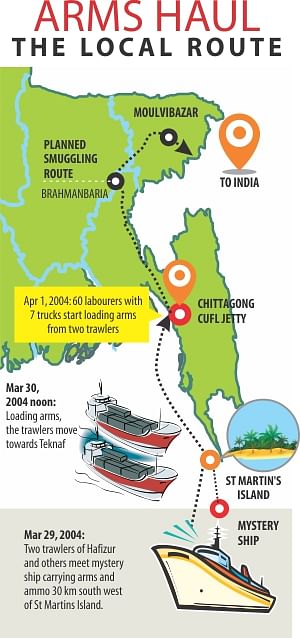Ulfa thrived, thanks to BNP-led alliance
Ulfa thrived, thanks to BNP-led alliance

Indian separatist group United Liberation Front of Asom (Ulfa) had found refuge in Bangladesh during the last tenure of the BNP-led government.
This has been proven through exposure of several smuggling cases like Bogra ammunition haul and Chittagong 10-truck arms haul in 2003 and 2004 respectively.
The cases revealed that the state machinery of the then BNP-led government had been allowing Indian separatists to use the Bangladesh territory to smuggle in arms for waging war in eastern India.
In their court admissions in the 10-truck arms haul case, arrested former director general of National Security Intelligence (NSI) Brig Gen (retd) Md Abdur Rahim, and its former director (security) Wing Commander (retd) Sahabuddin Ahmed revealed that Bangladeshi players had been working alongside Pakistani intelligence to facilitate such arms smuggling.
Ulfa military commander Paresh Barua, who was then based in Dhaka, had directly supervised the huge cache of weapons being brought into Bangladesh.
Paresh lived in Bangladesh for years upon protection from the BNP-Jamaat government and top brass of intelligence agencies, according to statements of the witnesses and accused in the arms haul case.
He used a pseudonym, Zaman, and went into hiding soon after the story of the 10-truck arms haul had started unravelling.
Sources said Ulfa had been allowed to set camps in Chittagong, Sylhet, Sherpur and some other bordering areas. Its members received arms training there and used to operate in India from the camps.
In July 2010, detained Ulfa leader Ranjan Chowdhury told interrogators that their activists had used the camps in Bangladesh between the BNP-Jamaat regime and early period of the last caretaker government. Injured activists had also received treatments there.
One of his interrogators, wishing anonymity, told The Daily Star, "Ranjan told us that to his knowledge, Ulfa has no training camp in Bangladesh now."

Organising secretary of Dhubri unit, Ranjan was responsible for providing the soldiers from 109 Ulfa battalion of Meghalaya, one of the five battalions of the separatist group, with shelter.
According to experts, the then BNP-led government adopted the policy to give Pakistani intelligence ISI leverage to disrupt peace in India.
Ulfa was founded in 1979 aiming to establish a sovereign Assam through arms struggle. It started major violence in 1990 prompting India to begin military operations against it. Over the last two decades, around 18,000 people died in fights between the rebels and security forces.
In 2007, soon after the caretaker government had been installed, Bangladesh began a crackdown on Ulfa bases and the effort got stronger during the tenure of successive Awami League government.
On December 5, 2009, different local and international media reported that some Ulfa bigwigs including its chairman Arabinda Rajkhowa, his deputy commander-in-chief Raju Barua, and top leaders Sashadhar Choudhury and Chitraban Hazarika had been detained by Bangladesh law enforcers and then pushed back only to be arrested by the Indian Border Security Force.
Both countries denied the incident.
Another senior Ulfa leader Anup Chetiya has been languishing in a Bangladesh prison since his arrest here in 1997.
In January 2010, Ulfa shifted from its demand for independence to begin a dialogue with the Indian government.
On September 3, 2011, the Indian government, Assam government and the separatist group signed a tripartite agreement on suspension of operations against Ulfa.